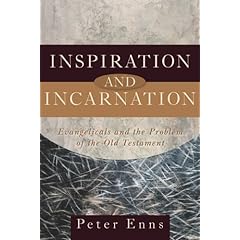And by the way, everything in life is writable about if you have the outgoing guts to do it, and the imagination to improvise. The worst enemy to creativity is self-doubt. - Sylvia Plath
Friday, October 19, 2007,9:41 AM
Book Review - Inspiration and Incarnation
 I just finished reading a book that I highly recommend for others to read. Not because I agreed with everything in it or because it is necessarily spiritually transformative, but because it presents a constructive, faith affirming approach to a topic that is generally written about in destructive ways.
I just finished reading a book that I highly recommend for others to read. Not because I agreed with everything in it or because it is necessarily spiritually transformative, but because it presents a constructive, faith affirming approach to a topic that is generally written about in destructive ways. A few months ago Scot McKnight recommended to me Peter Enns' Inspiration and Incarnation: Evangelicals and the Problem of the Old Testament. This book explores some of the difficult questions regarding cultural influences on the Bible, the diversity of theological views present in it, and whether or not it is necessarily unique. These are not new questions and have been bantered around the academic world for some time now, but most lay accessible books on these ideas take one of two negative approaches. They either present these cultural and historical facts in order to prove that the Bible is not to be trusted and that therefore Christian faith is misguided. Or the books are written from a defensive standpoint in order to generally deny the validity of the historical facts so as to prove the Bible trustworthy. These agendas on both extreme are lacking for the reader who is not persuaded to give up either her faith or her intellect.
Peter Enns' book takes a third way in its approach to the conversation. It apologetically assumes an evangelical faith in scripture from the outset and then sets out to explore the historical details in light of that faith. On this approach, the author writes -
The way we can begin to address this issue is to confess at the outset, along with the historic Christian church, that the Bible is the word of God. That is our starting point, a confession of faith, not creating a standard of what the Bible should look like and then assessing the Bible on the basis of that standard. If we begin with the confession that the Bible is God's word, that it ultimately comes from him, that it is what the Spirit of God wanted it to be, that there is no place in all the messiness of the Old Testament where God says, "Oops, I didn't really mean to put it that way - I'd like to try again, please" - if we begin there, we have the freedom to look honestly and deeply at what God is doing in the Bible." p108I appreciate that perspective. Instead of pretending to be objective in trying to prove one's agenda, I appreciate knowing the author admits the particular lens he is using to view the Bible. It isn't the only approach out there, but I found it refreshing as it led to an exploration of scripture that didn't create a false hierarchy between scripture and history. It is that acceptance of an interpretive tradition and embracing of one's cultural context that I've found lacking in most evangelical treatments of this subject.
Enns places the Bible and modern evangelicals firmly in their historical settings. About the Bible he writes, "It was not an abstract, otherworldly book, dropped out of heaven. It was connected to and therefore spoke to those ancient cultures." p.17 and "That the Bible, at every turn, shows how 'connected' it is to its own world is a necessary consequence of God incarnating himself"p20. The issues arise when both conservatives and liberals approach the Bible expecting it to be something it is not. When we desire for the Bible to speak only to the issues of a modern scientific society we display our arrogance in assuming that we are the only one's God has ever cared about conveying his word to.
The book then presents three issues that have generally not been handled well in evangelical theology. First it explores why the Bible looks so much like other Ancient Near East literature. Then it looks at the theological diversity present within the Bible itself. And finally it looks the sometimes weird (and generally out of context) ways in which the New Testament authors make use of the interpretive traditions of their day to interpret the Old Testament. Basically, is the Bible really unique, does it have integrity, and how should it be interpreted? Each discussion is fascinating and is helpful in that it is very open about the difficult parts of scripture. The result is a unique perspective that sees the Bible as the inspired word of God, but that embraces its very human and cultural elements as God's incarnation to us. We can therefore appreciate its diversity instead of deny it and allow the Bible to be what it is instead of what we wish it would be. So if these are issues you have ever struggled with or are just mildly curious about, I highly recommend this book as an easy, informed, and faith-affirming approach to the subject.
Tags:
Labels: Book Reviews, History, Theology

















ha, I just had to read this book for school. It was alright, I recommend it for evangelicals, but I certainly disagreed with some thing in it.
A book I would recommend that is similar to this but offers a different conclusion is 'Living & Active' by Telford Work. He sort of write it in response to Enns, and I actually like it a lot better :-)